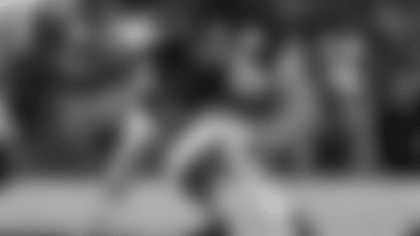Transcript of head coach Eric Mangini's news conference with the New York Jets media before Thursday's practice:
One piece of housekeeping. We signed Jason Capizzi to our practice squad, offensive lineman. Now the practice squad is full. He replaced Ray [Ventrone], who moved on yesterday.
In terms of yesterday, it was a traditional regular-season Wednesday, but it's really different than what we've been doing to this point. We had the preseason. Even in preparation for the first game, it was a long week where you were able to get ahead and do some things a little bit further along. This week, though it's going to be like most weeks, it is different. There's a large volume of information that comes in on Wednesdays. It's an opponent that we don't have a lot of familiarity with in terms of background or playing them or seeing them last year. Even me personally, I haven't faced the Ravens. So it is different. It's different especially for the rookies to get used to this format. It will obviously be standardized as we go, but it's another thing to adjust to.
We did first and second down yesterday. We'll move into third down here today. We'll review what we had yesterday. They present a lot of different challenges both offensively and defensively in terms of formations, shifts, personnel groups, the people that are there, the personnel we have to deal with, in addition to a very good special teams unit.
On DE Kenyon Coleman's Jets debut vs. New England …
I was really happy with Kenyon's performance. He's a player that we had a look at in terms of bringing him into the system, doing some of the same things, some of the variations in the system. We were able to see him on tape prior to him getting here, which is always an advantage. Then our familiarity with Bill [Parcells], talking to [Kenyon], spending time with him. He was a person we obviously liked very much in free agency. He's been a great addition in terms of the locker room and the value he adds there. I was pleased with Kenyon in the game and really throughout his time here.
On the point at which Coleman stops being "the new guy" …
I'm not sure when you stop being the new guy. I think each guy's a little bit different. You'd have to talk to those guys. I'm not sure what the process is there. It struck me that he had a good relationship not just with the defensive line very early on but with the whole group. He's a guy that does spend time with a lot of different areas. It's not specifically just hanging out with the defensive linemen.
On what kind of a vertical element Kellen Clemens can deliver …
Kellen did a good job in the preseason with some of the vertical balls. There were a couple of those vertical balls, though, that he was helped out with, where they hung up there quite a long time. Justin McCareins made a few really good catches on ones that were a little bit underthrown. Sometimes that's just the situation that you have and the receiver has to adjust. The quarterback has to adjust to the different speeds of the receivers. I thought he did do some nice things with that early on. He'll continue to work on that, like we work on the vertical passing game each week.
On how playcalling affects the offensive line in terms of whether they're protecting Chad Pennington or Clemens…
They're all core plays that you worked on throughout training camp, throughout preseason. There will be game-plan plays that you put in each week. But that's standard anywhere you are. Guys are used to that. That's part of the process. You just cater the plays that Kellen likes or Chad likes or Tui [Marques Tuiasosopo] likes or Brad [Smith] likes, whatever the case may be. You make sure there's a comfort level there with him running it, you have a comfort level as a coordinator and head coach with what's being run, and you come to a consensus. They're all plays you feel have a really good chance to be successful. Now you add the element of comfort level and execution and that gives you your best chance to get done what you'd like to get done.
On if there is one particular thing D'Brichashaw Ferguson is struggling with …
Each guy has different things that they specifically need to work on. And that's something, as you look at an offensive lineman or defensive lineman as an opponent, you're trying to figure out what those things are and you're going to attack those things. What you have to do as a player and as a coach, anybody who's part of the process, is really analyze what those weaknesses are and consistently work at those weaknesses.
Teddy [Atlas] was talking in the off-season about how sometimes your greatest strength can be your greatest weakness because that's what you always want to do. If you're a speed guy, you always want to run vertical routes. If you're a change-of-direction guy, you always want to run those intermediate-type routes. If you're a press corner, that's what you want to do because that's where your comfort level is. What you have to do is address the weaknesses as aggressively or more aggressively to make sure that you're balanced.
On whether he feels Ferguson is worrying about helping the left guard …
No, I don't see it that way at all. I think that group has to work together. Based on the protection, you know where your help is coming from or when you have to provide help. The look that comes up, things have to change so it's not specific to one element of the offensive line. It's really across the board. When you face a team like the Ravens or the Patriots, who give you a lot of different looks, it's that much more important to have continuity across the line. That's what they're always working on and we're always collectively working on.
On whether Thomas Jones is still feeling his way in this system …
We spent a lot of time in the spring, and he got a significant amount of reps in the spring. He's a veteran player who has a lot of experience in this system, systems very similar to this, a lot of other systems. He picks up information quickly. It's how he's used and things that we do with him are always going to be catered to who you're playing, so it will change dramatically week in and week out. Just like you do with the quarterbacks, there are certain plays that you like more for him, some others for Leon [Washington], but you don't make it so that those are the only plays they can run. You have the group of plays. You may favor certain ones. He may favor certain ones. They run the full package so that you can't hone in on tendencies.
On how he views the Ravens' defensive system …
It's an outstanding group of players. Ray [Lewis] was an impressive guy. I was there his rookie year, and he was an impressive guy as a rookie in terms of his command of the huddle, in terms of his presence. You sensed it, you felt it the second he hit the field. And I'm talking about OTAs, rookie minicamp. This wasn't later on in the process. And he continues to be that guy. With experience, the things he's seen, he's a very effective playcaller. He's a very effective leader.
When you add all the other terrific players they have in the scheme, I think Rex [Ravens defensive coordinator Rex Ryan] does a great job. He's very creative. There's elements of the 46, things Rob [Raiders defensive coordinator Rob Ryan] and I have talked about in the past, things we have incorporated into the defensive system in New England. You can see some of those things that stem from Buddy [Ryan].
He's also got a lot of things he's learned along the way that he likes. I know Rob extremely well. Very detail-oriented, very focused on tendencies and tips and keys, excellent at identifying those, even the subtle ones. In getting to know Rex, he's the same type of guy. With the 46, it was all based on BTF, "blitz the formation," and automatic fronts and coverages, AFCs. So you would come out, you'd look at their formation, and you'd be in the best play based on the formation. That was all based on tendencies and elements of that.
On whether it's challenging planning for their defense not knowing which QB will play …
It always presents challenges. It presented challenges when it was being run with Buddy, the elements of it that are here. There's elements of the 3-4 system, there's a lot of those, as well. So we have to prepare for multiple looks and we have to be able to execute the things you're doing at a high speed, at a very efficient level, whether it's shifts or motions. Being able to play fast negates their ability to zero in on things. That's something we always focus on with the no-huddle, the shifts and the motions.
On whether the Ravens are a more complicated team than most …
There are a lot of things you have to address. They do a nice job with the schemes. But the players also do a nice job with disguising what they're doing, which is positive. And built into our system with the no-huddle, the shifting, the motioning — a lot of that helps slow things down. The faster you operate, the faster you change the look, the faster you get to the final look, execute the play, the speed of the play, the receivers — the absolute complete process can slow it down.
On what Pennington was able to do at practice Wednesday …
We have a program for him, and he followed the program. It will change each day.
On how Pennington looked …
He looked like he was working to get ready [smiles].
On whether Pennington will be the starting QB if he misses this game and returns …
Chad's the starting quarterback. He's the starting quarterback.
On how he would assess Ferguson's progress …
I was really happy with his approach the whole off-season. He spent a lot of time with Tony [Wise] and Mike [Devlin] further learning the system. He and Nick [Mangold] spent time together working on the system. He spent a lot of time in the weightroom working on overall body strength. He spent the time with Lomas Brown. He was really working at his craft, addressing a lot of things he wanted to address, that we wanted him to address. I thought he's had a very good training camp.
As a second-year player, it's a process. He's in a very difficult position. Left tackle in the NFL is as challenging as it gets. You're going to face great pass rushers each week. You have to just keep moving forward, and that's what he's been doing.
On whether Ferguson needs to work on his recognition skills …
Each one of those stunts, whether it's New England or Baltimore or whoever it is, there are different ways you have to play the stunt, just like you'd have to play a front. Sometimes the stunt is a clean stunt where the tackle will go first, the end will wrap around. Sometimes it's a function of the tackle trying to slam into the offensive tackle to create space, then the end wraps around. They're different. You just got to work on them. They're tough. Those stunts are tough to pick up. You're always, always working on them. That's why you run them defensively.
On why Willis McGahee has presented so many problems for the Jets defense …
I think he's a really good back. I like the way he's able to hit things downhill, whether it's inside the tackle box or the speed that he has at the edge. He's got good speed once he gets into the open field, and he's got an excellent stiffarm. He's been productive against a lot of people and he's a challenging player.














